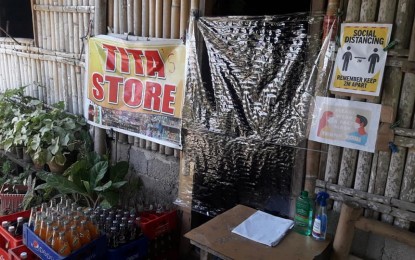
ASSISTANCE. A sari-sari store in Pandan, Sarrat, Ilocos Norte. The provincial government, through its Small and Medium Enterprise Office, is giving each small sari-sari store at least PHP2,000 worth of grocery items as part of the Covid-19 recovery assistance to the vulnerable sector, head of the office, Elma Gabriel, said Thursday (Oct. 28, 2021). (Contributed photo)
LAOAG CITY – Ilocos Norte’s provincial government, through its Small and Medium Enterprise Office (SMEO), is giving each small sari-sari store at least PHP2,000 worth of grocery items as part of the continuing coronavirus disease 2019 (Covid-19) recovery assistance to the vulnerable sector.
Based on the latest data of the SMEO, 9,000 pre-identified sari-sari store owners in the province need immediate assistance and 715 of them are from the towns of Bacarra, Sarrat, Piddig, and Laoag City have received the grocery pack aid.
Head of the SMEO, Elma Gabriel, said Thursday due to the rising cost of basic commodities, Governor Matthew Joseph Manotoc has directed that these sari-sari store owners would receive nearly PHP3,000 worth of grocery items during the next batch of distribution.
“This is a quick-relief assistance program to our small businesses and we hope to reach out to them (at) the soonest possible time,” Gabriel said.
According to local businessman and marketing specialist Bryan Alcid of Laoag City, the resiliency of the Ilocanos has been proven, particularly in the time of pandemic when many residents who are not business savvy have gone into marketing and business enterprise development, such as putting up a sari-sari store at home to avoid rentals.
“During our last business review, the number of sari-sari stores alone grew by 50 percent. This is because the displaced workers have started their own business, apparently to survive the pandemic,” Alcid said.
He noted that with this change in the Ilokano’s mindset in the past two years, there is a need to assist them on how to recover during and after the pandemic.
The SMEO is working in partnership with both public and private sectors for the conduct of various training courses and provision of interest-free loan assistance to help small businesses grow and recover what they have lost due to the unforeseen health crisis.
Other businesses are likewise adapting to the new normal as they keep an eye on new opportunities brought about by the series of lockdowns and limited mobility. (PNA)
